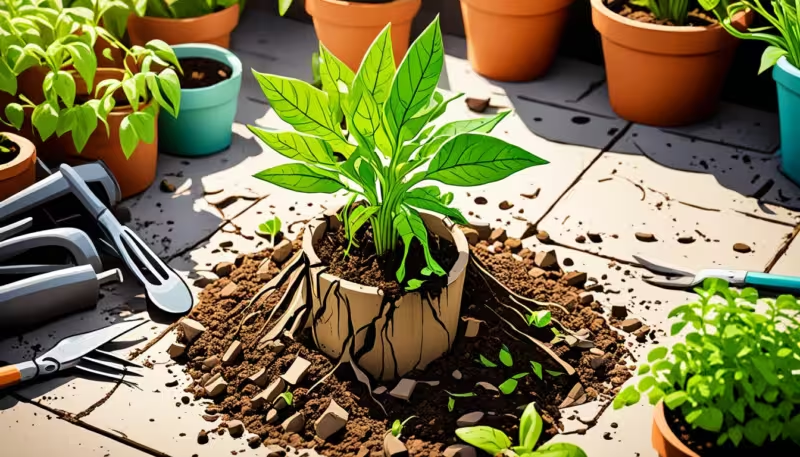Have you ever thought about why some bounce back after failing, but others can’t move on? Failure Recovery is key to growing. It’s not about feeling sorry for ourselves. Instead, we learn from our setbacks. This helps us grow stronger and wiser.
Being open to failure shows we’re ready to learn and improve. Every mistake is a chance to get better. With a growth mindset, every failure is a step towards success. It sparks innovation and keeps us moving forward.
The Role of Failure in Personal Development
Failure is a key driver of personal growth. It teaches us through our toughest times. By accepting failure, we learn resilience.
This resilience lets us stand up after a fall. We then face new challenges with courage and flexibility.
History is full of people who turned failures into successes. Thomas Edison tried 10,000 times before inventing the light bulb. Arianna Huffington was rejected by 36 publishers before finding success. Their stories teach us to see failure as a chance to grow.
Realizing mistakes are part of learning is vital. It drives our desire to improve. Reflecting on setbacks, we gain insights that help us move forward.
People who use failures to learn can solve problems better. They also make smarter choices. Viewing failures as lessons, not obstacles, is key.
A supportive setting helps people learn from failures. Studies show that encouraging workplaces boost motivation. Working through failures positively benefits us and our teams.
Understanding the Growth Mindset
A growth mindset is key to getting better and facing hurdles. It was brought to light by Carol Dweck, a psychologist at Stanford University. She found that people often think their smarts and abilities are set in stone. Those with a fixed mindset dodge challenges and don’t take well to criticism. This stops them from learning well and limits how they tackle problems.
On the flip side, those with a growth mindset see skills as things they can build. They think hard work, learning, and practice can make them better. They also see mistakes as chances to grow. This outlook helps them try new things and take feedback well. It’s a big part of growing.
Neuroplasticity is a big deal in changing mindsets. It lets our brains change and grow by making new connections based on what we learn and experience. Having a growth mindset makes you more resilient and opens the door to new opportunities, especially when bouncing back from tough times. It’s crucial for those dealing with issues like anxiety, trauma, or addiction. The right mindset can really make a difference in recovery.
Studies show that people with a growth mindset are more determined, involved, and less scared of failing. But a negative mindset can make stress worse, raise health risks, and slow progress. Getting help from experts and using the skills from treatment can help. With a growth mindset, you can boost your health and truly change your life.
Failure Recovery: Transforming Setbacks into Comebacks
Recovering from failure is key to turning setbacks into comebacks. It’s important to face our feelings when we fail. Learning from failure helps us grow and become stronger. Setbacks are not the end. They are chances to get better.
Dealing with negative feelings like frustration or sadness is part of recovery. Acknowledging these emotions helps us move forward. It also leads to important lessons from our experiences.
Seeing failures as helpful feedback changes how we view setbacks. It helps us learn and grow. A growth mindset turns challenges into chances for progress. Thomas Edison and J.K. Rowling turned their many rejections into success. Their stories show how failures can be lessons that lead to great achievements.
Using strategies like “push, push, pause” helps us adapt. It’s important to set clear goals and focus on progress, not perfection. Being patient is key. It helps us avoid making rushed decisions based on disappointment. In the end, learning from failure makes us ready to face new challenges.
Analyzing Mistakes for Success
Analyzing mistakes is key to achieving success. It helps us see what went wrong and how to improve. By reflecting on our failures, we discover what factors led to them.
This process teaches us valuable lessons. It turns our setbacks into chances for growth. With careful steps, we learn to avoid past mistakes. This helps us meet our goals better.
- What was my original goal?
- What actions led to this outcome?
- What assumptions did I make that may have been flawed?
These questions help us find important insights. They aid in our personal growth and make us resilient.
Finding patterns in our mistakes is helpful. It shows us which errors we often make and why. Knowing this, we can change our ways. This leads to personal growth.
It’s important to turn what we learn into actions. By planning based on these lessons, we can improve. Embracing this cycle of learning from failure makes us stronger. It pushes us to develop ourselves.
The Importance of Accountability
Accountability is key on the path to personal growth. It means owning up to what you do. This helps you see what you’re good at and where you need work. By admitting flaws, you build trust in your relationships. This support is crucial for growth. It’s very important for staying sober too.
Taking responsibility shows you recognize your part in what happens. For people getting over addiction, dodging this can make them feel alone. Joining groups or programs helps with facing up to things. It leads to knowing yourself better and fighting off the urge to fall back into old ways.
Being honest is core to being accountable. Telling the truth about what you do and its effects helps tackle addiction. Saying sorry for wrongs helps heal emotions. It also rebuilds trust, getting you support for your growth.
Having friends or mentors who don’t drink or use drugs helps keep you on track. Staying in touch with them keeps you eager to do well. They help you set goals you can really achieve. Being accountable lowers the chance of going back to old habits. It builds a trusting, helpful environment that’s great for growing as a person.
Seeking Feedback and Support
Getting feedback and support helps us grow a lot. When we listen to what others say, we learn from our mistakes. Good criticism brings new ideas and helps find better ways to get better. Having strong support helps us work together and stay strong through tough times.
Listening to others is really important. Advice from mentors, friends, or family shows us where we need to improve. It makes us think differently, leading to new solutions and better understanding. Looking closely at feedback helps us see what needs work.
It’s important to have people around who support us. A network that lets us share and get advice helps us grow. Talking about our failures makes us stronger together. After getting feedback, making a plan with clear goals is key. This plan, along with thinking about the changes we make, helps us stay flexible and meet our goals in life and work.
Embracing the Learning Process
Learning to fail is as important as learning to succeed. Mistakes are not just obstacles; they help us grow. Many kids think getting anything less than an “A” means they failed. This belief makes them link their worth to grades, which change a lot. Teaching them to see mistakes as chances to get better is crucial.
Parents often try to keep their children from feeling sad. They think it protects them. But this can actually stop kids from becoming resilient. Usually, the lessons we learn from failing are more valuable than those from winning.
There are ways to help kids deal with failure positively. These include:
- Looking at mistakes without blame
- Showing it’s okay to mess up
- Being thankful
- Making lists of good things done
- Living in the moment
Boosting kids’ confidence is vital. It helps them see they’re worth more than their grades. Emphasizing growth, like Carol Dweck suggests, changes how they view failure. Getting feedback is also key. It helps fix what’s not working and understand failures better.
Learning from failures makes kids stronger, ready for future problems. Taking risks and failing can lead to new ways of thinking. Dealing with emotions wisely when failing is important too. Trying, failing, and improving is how innovation happens.
Not being afraid to fail encourages us to face challenges bravely. Understanding why we failed helps us do better next time. Different age groups can manage their emotions in various ways. For instance, young kids might use breathing exercises, while older ones think deeper about their failures. These strategies improve how they learn.
Dr. A.P.J. Abdul Kalam said failure is just the start of learning. Seeing failures as steps to get better is key. After failing, we gain valuable insights. This makes us more resilient and ready for the next challenge. By accepting failure, we keep getting better and grow as people.
Transforming Fear into Curiosity
Turning fear of failure into curiosity lets people tackle challenges openly. This change leads to exploring new solutions and seeing things differently, driving personal growth. By being curious, people use mistakes as chances to learn, not fail. This builds strength and flexibility on their path.
Finding opportunities in failures is key to developing a better mindset. It shifts how we see setbacks, making us hunt for lessons instead of defeats. Viewing failures as chances for learning turns them into guides for better choices ahead.
Understanding the bond between risk-taking and growth highlights how important it is to accept change. Knowing that risks are part of getting better is crucial. Welcoming the unknown offers a world full of learning moments. This readiness to learn helps people move past their fear of messing up. More and more, individuals adopt this mindset, seeing change as a stepping stone, not a setback.
Practical Tips for failure Recovery
Recovering from failure is key to becoming resilient. By applying tips and strategies, one can turn setbacks into growth chances.
- Mindfulness: This keeps you focused on the present, helping handle emotions well.
- Positive self-talk: This replaces bad thoughts with uplifting ones, boosting resilience.
- Reframing setbacks: This means seeing failures as chances to learn and do better.
A survey of Forbes Business Council members found many value learning from failures. Out of 16, 13 highlighted reflecting and learning as key to bouncing back.
For long-term success, keep learning and adapting. Important methods include:
- Consistent self-reflection: Regularly evaluate your experiences to gain insight and grow.
- Setting achievable goals: Realistic goals help you see progress and adjust plans.
- Developing new skills: Learning new skills prepares you for future obstacles.
Having the right mindset improves your recovery chances. Positive thinking and focusing on learning instead of fearing failure are crucial.
Building a culture that sees failure as a lesson also helps. Teamwork and sharing insights turn challenges into opportunities to learn together.
In essence, using these tips can significantly improve your resilience. They help you not just recover from setbacks but also succeed despite them.
Reflecting on Past Failures to Drive Future Success
Looking back at past mistakes is key for future wins. This helps us learn and grow, making us stronger. We learn to value our ups and downs alike by seeing failure as a learning step.
Journaling is a great way to reflect. Writing down your struggles and insights helps spot trends and learn. Techniques like SWOT and root cause analysis dig into mistakes, guiding better choices ahead.
It’s important to enjoy the journey for lasting toughness. Past bumps in the road make us smarter and more flexible. Seeing failure as a chance to learn changes how we view challenges.
Help from mentors and friends keeps us on track. Setting SMART goals points us in the right direction. Celebrating our wins keeps us moving forward with spirit.
Failures teach us about work and life, boosting our growth. By embracing these lessons, we set ourselves up for more wins.
The Impact of Resilience on Overcoming Failure
Resilience goes hand in hand with failure recovery. It lets them recover and adapt after tough times, which happens a lot in life and work. Entrepreneurs, for instance, run into many obstacles that can be discouraging. Their journey is full of ups and downs, but resilience helps them stay strong and learn from these experiences.
Building resilience helps individuals manage stress better. It shields them from the bad impacts of challenges, enabling them to take back control and learn from each situation. Being resilient can lead to growth and even making situations better. It can turn failure into a chance for new goals and stronger connections.
To grow resilience, one must learn specific skills. These include solving problems, managing emotions, and communicating well. Taking care of oneself and seeing the value in life boosts personal growth. This makes facing problems easier. Resilient people see problems as learning opportunities.
- Recovery: Resilient folks bounce back quickly from hard times, keeping their eyes on their goals.
- Resistance: They can deal with stress and tough times well.
- Reconfiguration: It’s important to adapt to changes and find stability.
Successful business owners often build strong support networks. They get advice from mentors and peers, which helps create a community of learning. Sharing stories of failure can lead to mutual growth and builds resilience.
In conclusion, becoming resilient is a journey. It’s shaped by one’s personality and experiences. It’s not static but grows with effort and time. Just like exercising a muscle, daily dedication is needed. It strengthens the ability to face and conquer life’s challenges.
Conclusion
As we wrap up our look at failure, its clear it’s key to growing stronger. Every mistake is a chance to look inside ourselves and learn. It helps us to change for the better.
Whether you’re a person or a company, seeing failure as a step forward is important. It’s not just an obstacle. It helps us succeed. By understanding this, progress happens.
Recovery plans and knowing what customers think are crucial when dealing with failure. Creating a culture that learns from mistakes can turn unhappy customers into loyal ones. This change not only keeps customers but also boosts a business’s success.
Overcoming failure is a very personal journey. It takes time, self-forgiveness, and accepting our human flaws. By doing so, we grow stronger and more prepared for the future. This journey sets us up for ongoing growth and success.






